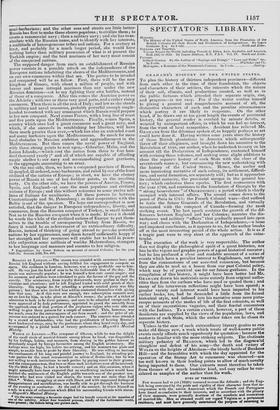THE POWER OF RUSSIA, AGAIN.
A CORRESPONDENT, who is generally well satisfied with the ex- posure made in the Spectator, 21st November, of the substantial unbecility of Russia in so far as her power of aggression is con- cerned, still thinks, however, that we have not sufficiently dwelt upon the danger apprehended from the establishment of Russian power in Constantinople. A few words, therefore, may be added upon this point. Let it be supposed that Russian dominion is established on all the shores of the Black Sea, the Bosphorus, and the Sea of Mar- m ma, and that she is in full possession of the Straits of the Dar- daaelle3. The shores of the Black Sea are thinly peopled by
semi-barbarians; and the other seas and straits are little better Russia has first to make these shores populous ; to civilize them ; to create a commercial navy ; then a military navy; and she has to as- similate with the Russian name, and to identify with her interests, a multitude of heterogeneous tribes and nations. For a century at least, and probably for a much longer period, she would have nothing better than military possession of what is at present the Turkish empire; and the best mariners of her navy must consist of the conquered nations. The supposed danger from such an establishment of Russian power consists in a possible attack on the independence of the European nations inhabiting the shores of the Mediterranean,and on our own commerce within that sea. The parties to be invaded and conquered will be as follow. First, there will be the new kingdom of Greece, with about a million of people, and with braver and more intrepid mariners than any under the new Russian dominion—not to say fighting their own battles, instead of those of a conqueror. After this comes the Austrian power on the Adriatic ; with two or three very good ports, and a rather rising commerce. Then there is all the rest of Italy; and low as she stands in military and naval resources, probably powerful enough single- handed to contend with any armament which Russia could prepare in her new conquest. Next comes France, with a long line of coast and five ports upon the Mediterranean. Finally, comes Spain, a country which once bad a great commerce and a great navy, and which, if she succeeds in establishing her liberties, will have them much greater than ever,—which has also an extended coast and many harbours upon the Mediterranean. So much for mere local obstacles to Russian ambition and aggrandizement in the Mediterranean. But then comes the naval power of England, with three strong points to rest upon,—Gibraltar, Malta, and the Ionian Islands,—which cost the nation from three to four hun- dred thousand yearly ;* and all of which are capable of affording ample shelter to our navy and accommodating great garrisons, in the aggregate amounting to an army. On the one side, then, we have a conquered province of Russia, ill-peopled, ill-ordered, semi-barbarous, and ruled by one of the least civilized of the nations of Europe; in short, we have the clumsy power of Russia at one of her feeblest points, as the assailing party. On the other side, we have the powers of Austria, France, Spain, and England—at once the most populous and civilized nations of Europe; and this without reference to some twelve mil- lions of Italians for auxiliaries. All these powers lie between Constantinople and St. Petersburg ; so that cooperation with the Baltic is out of the question. We hope our correspondent is now satisfied, that the danger to European independence, liberty, and commerce, from the Russian conquest of Turkey, is small indeed. Not so to the Russian conquest when it is made. If ever it should be worth the while of the civilized nations of Europe to put them- selves to the trouble of reconquering Turkey from Russia, we fancy it would be an achievement of no extraordinary difficulty. Russia, instead of thinking of going abroad to provoke powerful nations by her aggressions, may deem herself sufficiently happy if her strength and her resources will enable her to hold in peace- able subjection some millions of warlike Mahomedans, strangers to her language and manners and enemies to her religion.
• Expenditure by Great Britain on account of several Colonies, for the year 1833-34. Session 1835, No. 408.



























 Previous page
Previous page